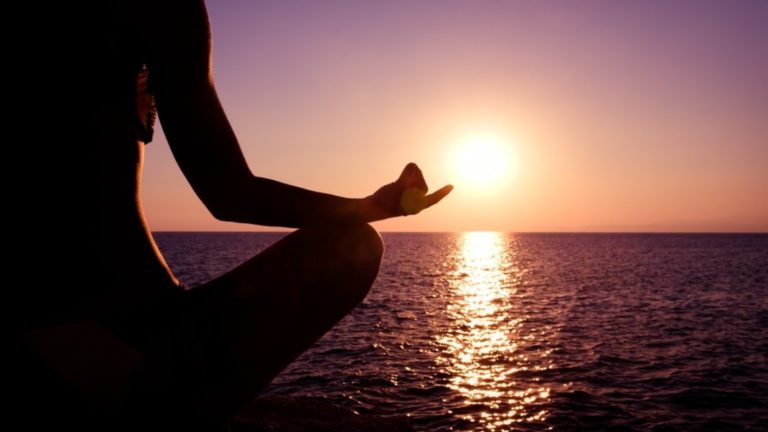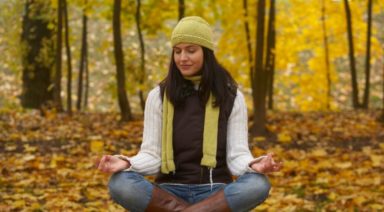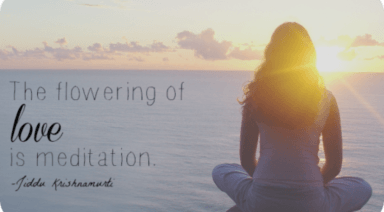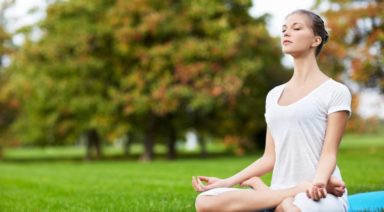Unlocking the Mystery of Meditation

Meditation is a mystery to those who have not experienced it. Part of the trouble is that the language of meditation can seem esoteric; we’re talking about the mind and our experiences in the mind, which can be difficult to articulate. The best way to demystify this enigma is through practice and experience.
It is only through the experiential level that one can truly understand the power and simplicity of meditation. It’s an interconnected phenomenon that can radically change one’s outlook on life. Below are some key milestones of the development of the mind:
- First, one begins to meditate on a daily basis.
- Then, one’s perspective on life completely changes.
- Lastly, one’s life does change based on new attitude, different decision making, less reaction & more action, and positive energy
Everyday situations that initially seem overly complex can begin to unravel one by one, like the layers of an onion. Perhaps we’ve been stuck in the same job, or our partner doesn’t love us how we want them to, or life just isn’t fair—”others are always getting better opportunities than we are”. We blame these things on the fact that we [are just] unlucky and there is nothing to do about it. Meditation can help us reduce our attachment to the way things are so we can better understand why things are. Just simply reality for what it is.
Meditation helps us understand that changing our external circumstances begins with changing our mental attitude. We can attend a zillion yoga classes, read self help books, talk to therapists and complain to others. But until we stop the runaway train of our minds and simply sit with the reality as it truly is, we won’t find the kind of clarity that leads to happiness, contentment and joy.
Meditation doesn’t make our problems disappear; meditation helps us see our problems clearly, and makes mental space for solutions to arise.
That is the beauty of meditation.
- The beauty of taking control of one’s outlook.
- The beauty of understanding our motives.
- Understanding our mistakes.
- The beauty of moving past the clutter in the mind and towards inner peace.
Three easy steps to commit to the practice of meditation:
1. Make a commitment to sit. Join a class. Attend an online course. Read a book about meditation—there are so many to choose from! Take baby steps at first. Once you learn the basics, start small. Five minutes a day will lead to 10 minutes, then 15…
**2. Ask for support from your friends and family. ** Let them know about your commitment to meditate. A sangha of like-minded friends is the best framework for support.
**3. Do not waver! ** Times will get tough and your mind will wander like a monkey leaping from tree to tree in the jungle. You are not alone in this—in fact, this state of mental unrest is known as “monkey mind”! Keep coming back to your practice again and again, and eventually the monkey will get comfortable and take a nap.
By learning the technique and practice of meditation, you will begin to develop wisdom derived from deep within the subtle body. From that, you will begin to know yourself. When we know ourselves, we can begin the slow process of knowing others and developing compassion and equanimity for all sentient beings.
“The physical world, including our bodies, is a response of the observer. We create our bodies as we create the experience of our world.” ~Deepak Chopra
Meditation and Mindfulness; Methods for Lasting Peace

Mindfulness is an essential and useful pathway that leads to peacefulness. It isn’t rocket science, it doesn’t require a trendy workshop, and it doesn’t require that you live in an ashram.
“Each place is the right place. The place where I now am can be a sacred space.”
– Ravi Ravindra
What is Mindfulness?
The most basic definition of mindfulness might be the act of paying attention to the things that you are experiencing, and then choosing peacefulness in relation to every action, person, thought, feeling, and response.
Mindfulness in its purest form has the following characteristics:
- Being fully present to what’s happening in this moment
- Leaving the past in the past
- Letting fantasies of the future dissolve
- Refraining from self-judgment and judging others
- Keeping emotions in-check
- Responding instead of reacting
- Strengthening our connection to our core selves















